McGuffey’s Eclectic Reader
From 19th century Eclectic Readers to 20th century progressive indoctrination, today it is Gender Queer books in school libraries.
No one has a temper naturally so good, that it does not need attention and cultivation, and no one has a temper so bad, but that, by proper culture, it may become pleasant. One of the best disciplined tempers ever seen, was that of a gentleman who was naturally quick, irritable, rash, and violent; but, by having the care of the sick, and especially of deranged people, he [Roger Sherman] so completely mastered himself that he was never known to be thrown off his guard.
Eclectic Reader No. Five p 2041
Words 2,557 ~ Read Time 11 min
Foreword
Originally published on October 11, 2020, this essay portended the three-year rise of the hyper-amoral worldview imposed on children. Thus, it is time to review, update, and significantly enhance the information about the literary works known as McGuffey’s Eclectic Readers. The goal: expose the overarching corrupted postmodern “education” machine.
Introductory Summary
McGuffey’s Eclectic Readers, a remarkable series of schoolbooks, remains largely unknown today.2 Few “educators” have a clue about McGuffey himself. This lack of recognition stems from dismissing his works as outdated relics of the 19th century, perceived to be incompatible with modern collectivist “educational” ideology. However, beneath the surface lies a critical examination of contemporary education systems and their failures to equip students with essential skills for lifelong learning.
William Holmes McGuffey hailed as “the schoolmaster to the nation,” gave us pioneering efforts in education that left an indelible mark on American history. Born into a devout Presbyterian family in Pennsylvania, McGuffey’s journey led him to become a revered educator and prolific author. His collaboration with publishers in developing the Eclectic Readers revolutionized how generations of students learned to read and understand the world around them.
Despite resistance from prevailing educational philosophies, McGuffey’s Readers became a cornerstone of American education, shaping the minds of millions of students over several decades. Their enduring influence extended beyond the classroom, offering a shared cultural experience and imparting timeless values of integrity, hard work, and charity.
However, as the 20th century unfolded, progressive ideologies seeking to reshape the educational landscape attacked traditional educational values embodied by McGuffey’s Readers. Yet, despite these challenges, McGuffey’s legacy persists, finding resonance among homeschooling communities, private schools, and those who value the timeless wisdom encapsulated within his works.
In today’s rapidly evolving educational environment, McGuffey’s teachings offer a timeless reminder of the importance of fostering intellectual curiosity, moral integrity, and a love for learning. As we confront the complexities of modern education, let us not forget the profound impact of McGuffey’s Eclectic Readers—a testament to the enduring power of education to shape minds and hearts for generations to come.
The Readers
The extraordinary series of schoolbooks called McGuffey’s Eclectic Readers is virtually unknown to most people. What is more disturbing is that our teachers today have never heard of McGuffey. Why? The crummy “professionals” and Pavlovian puppets controlling our schools regard the Eclectic Readers as outmoded historical objects from the 19th century. McGuffey’s works are indeed something to scorn as his books provided students with a Christian worldview and solid morals, values, and principles. We cannot have such things today; this would breach the worshiped wall of separation. More importantly, it goes against the grain of the transhumanists who think they are saving Mother Gaia.
The above aside, McGuffey’s Readers’ essential consideration is that they are all about something the school system frowns upon — students reading good, wholesome material. In addition, our school system has failed to give people the tools necessary for learning beyond the classroom. Specifically, the ability to read, understand, and think. The reading crisis directly results from a century of radical educational experimentation. Every day, the news abounds with facts about the terrible state of our education system. Unfortunately, just like the money crisis, lousy legacy media only reports the surface of the educational crisis, not the core of the problem.
William Holmes McGuffey (1800-1873), the Eclectic Readers creator, is known as “the schoolmaster to the nation.” He was born into a Scottish-Irish family in western Pennsylvania. As a youngster, his devout Presbyterian family moved to Ohio. William graduated from college in 1826 and then worked in various teaching positions. He quickly rose to professor of ancient languages at Miami University in Oxford, Ohio.
During the 1830s, the publisher Truman and Smith of Cincinnati, Ohio, approached Catherine Beecher3 to author a series of readers. Beecher declined but recommended William, who agreed to develop four readers. He completed the task in just two years, and in 1836-37, the four Readers plus a “Primer” got into the hands of teachers.
After completing the first editions of the readers, McGuffey was ordained as a Presbyterian minister and served as president of two colleges in Ohio. In 1845, he moved to the Old Dominion and became a professor of moral philosophy at the University of Virginia.
By the time McGuffey died in Virginia (1873), up to 50 million sets of his books were distributed to teachers and students. Nevertheless, he never received more than the original amount supplied for writing the readers—$1,000. After his death, the Readers continued to succeed, and William’s younger brother Alexander (1816-1896) sustained the excellent work by writing the Fifth and Sixth Readers. Alexander also authored the McGuffey Eclectic Speller. After his passing, all of the Readers remained a staple in educational circles. Many thanks go to Speaks reader R.K., who acquired an original 1863 copy of the Speller and gifted it to me. It is a treasured item in my library.
The Readers dominated education from 1836 to the 1920s, with over 120 million copies sold. As such, they were one of this period’s most widely used works of literature; as many as half the children learned to read the “McGuffey way.” Furthermore, the Readers gave students a shared experience through knowledge of our founding history and culture. The Readers influenced many of our influential figures from the past in a positive way. For example, Teddy Roosevelt used “Meddlesome Mary” to describe governmental shenanigans. Meddlesome Mary is the McGuffy Reader character named Matilda.4
Analysis
Today, a person who does not know about McGuffey who first picks up a set of the Readers is bewildered by the elevated reading level, particularly in the Fifth and Sixth books. Even today’s college students would have difficulty studying the contents of these two books. The Readers, designed initially for one-room schoolhouses, helped children from age six to late teens who shared the same teacher. In this setting, learning was natural, and each pupil advanced at their own pace. So, there was no collectivist educational system with a penchant for “social studies.”
McGuffey’s Readers offered an array of great American and English literature. The Readers included passages from various literary works, including those by influential authors like Lord Byron, John Milton, William Shakespeare, James Fenimore Cooper, etc. Much to the hateful sustain of dogmatic secularists, references to the Bible are common throughout the series of McGuffey Readers. As for morals, values, and principles, the readers hold tales and lessons about the importance of charity, hard work, and honesty throughout each book.
Teachers throughout America used McGuffey Readers until the end of World War I. During this period, John Dewey, head of the Teachers College at Columbia University (1904 to 1930), and his colleagues started an assault on traditional American education. The public education system began to teach our children to be socialist members of a one-world citizenry.
Criticisms
While the McGuffey Readers are criticized when viewed through a contemporary mind-meld lens, it’s essential to consider the historical context in which they were developed and widely used.
Firstly, the McGuffey Readers were primarily published in the early to mid-19th century, when societal attitudes and norms vastly differed from today’s crummy “standards.” During this period, the sin of slavery was, unfortunately, a pervasive institution in the United States, and we know biases of all types existed.5 Referring to Native Americans as “savages” was, unfortunately, reflective of the prevailing attitudes of the time.6
For the secular sin of “traditional gender roles,” that is a red herring. Biological sex/gender remains a reality today despite the inane quips vomiting forth from the highest levels of government, such as “birthing persons.” The historical division of labor between males and females, resulting in women primarily assuming domestic roles, can be attributed to harsh physical realities and societal constructs. The demanding nature of agricultural labor, cultural norms, and economic factors reinforced the need for women’s best and most secure place in the home. Today, we have women in combat roles.
Anti-Semitic and anti-Catholic sentiments were regrettably common in many segments of society during this era.7 Like slavery, we must learn from these issues and move on. Only a mob mentally torches everything, including the good, in the quest for their utopia, which is, in reality, a dystopian future. More to the point, as a person subject to anti-Catholic sentiments, such a reality does not invoke me to hate the Protestant-based McGuffy Readers. Unlike the pickled brain of the postmodern miseducated students and tell-u-vision-directed masses, I go beyond these issues to see the overarching good of the Readers.
The frontal assault aside, the McGuffey Readers have enjoyed the enthusiastic support of many influential people, including Teddy Roosevelt. Henry Ford, who left school at age 15, credited the McGuffey Readers for his success. Ford bought the birthplace log cabin where William Holmes McGuffey was born. After the 1932 purchase, he moved the usable components to his famous Americana museum at Greenfield Village in Dearborn, Michigan. There, he rebuilt the house, which is on display today.
Back to the Future
Readers get used today, but not in the government’s “educational” machine. Private schools and home school aficionados find the Readers the most essential and effective educational instrument, bar none. Some Amish communities use the readers to educate their youngsters. Other significant works of the era include New England Primer and Noah Webster’s Blue-backed Speller. Any attempt to introduce these works or the McGuffey Readers into government schools would surely elicit the inane and juvenile-like knee-jerk reaction of “Christian Nationalism.”
Books like Gender Queer, Let’s Talk About It, and Fun Home get protected under the quixotic cover of “anti-book banning.” But hidden in plain sight, these perverted books (click on the above link to look for yourself) promote unnatural sex acts between children. Nevertheless, the same comrades who pound their fists with the mantra “right-wingers are banning books” are just projecting.8 These perverted mental giants with pea brains work in warp drive to ban the Bible and Shakespeare.9 Remember, the Readers include passages from these great works. Under the crummy cover of Diversity-Inclusion-Equity and Accessibility (DIE-A), the WOKE (Willfuly Overlooking Known Evil) mob gets their way with government handouts promoting unnatural and perverted sex acts. Furthermore, lazy MACA (Make American Communist Altogether) persons who are non-procreative sex promoters (and/or addicts) rule the roost.
Meanwhile, parents of school children who still have common sense and object to the secret grooming of their children by the crummy “education” cartel face terroristic threats. Specifically, to raise the specter of the educational system’s Dogmatic Secular-Sexual Humanism (affirming children into a science fiction-like biology), you get placed on an FBI terrorist watch list. Or, as a backup plan, just shut them down and out. Meanwhile, invaders enter the country carte blanche, with the uber-privileged ones shuttled in on government-chartered flights.10
Conclusion
In conclusion, McGuffey’s Eclectic Readers’ legacy is a testament to a bygone era when education prioritized moral and intellectual development. Yet, in today’s educational landscape, McGuffey’s name has largely faded into obscurity, overshadowed by modern ideologies and political agendas that dismiss his works as antiquated relics of a Christian worldview.
McGuffey’s Readers provided students with a solid foundation in reading and comprehension and instilled values of integrity, hard work, and charity. They offered diverse literature, including passages from influential authors like Lord Byron, John Milton, and William Shakespeare, fostering a shared cultural and historical experience among students.
However, as the 20th century progressed, the traditional educational values embodied by McGuffey’s Readers came under attack from progressive educational theories championed by figures like John Dewey. The rise of collectivist ideologies and a shift towards socialist education aimed to mold students into conforming members of a global citizenry.
Despite this assault on traditional education, McGuffey’s Readers have found renewed appreciation among private schools, homeschooling communities, and even the Amish, who recognize their enduring value in imparting essential knowledge and timeless principles.
Yet, as we navigate the complexities of modern education, we find ourselves grappling with a paradox. While books promoting questionable ideologies get celebrated under the guise of diversity and inclusion, classics like those featured in McGuffey’s Readers face censorship and condemnation. The education system’s prioritization of political agendas over genuine learning has left concerned parents facing intimidation and even being labeled as threats for advocating for their children’s well-being.
In this turbulent landscape, the teachings of McGuffey offer a beacon of clarity, reminding us of the timeless importance of fostering intellectual curiosity, moral integrity, and a love for learning that transcends political ideologies and cultural trends. As we reflect on the past and confront the present challenges, let us not forget the enduring wisdom encapsulated within the pages of McGuffey’s Eclectic Readers—a testament to the power of good education to foster minds and hearts for generations to come.
The creepy, crummy, postmodern Pavlov Dog reaction aside, thank you, William Holmes McGuffey. 📕
I warmly encourage you to consider becoming a paid subscriber if you have the means. Tips are appreciated, too. Regardless of your choice, your support is deeply appreciated. From the bottom of my heart, thank you for your invaluable support!
Passage by John Todd, D.D. (6. 1800, d. 1873), born in Rutland, VT. In 1842, he settled as a pastor of a Congregational Church in Pittsfield, Mass. In this entry of the Fifth Reader, Paster Dood writes about the great Roger Sherman.
“Eclectic” is an adjective that describes something or someone composed of elements from various sources or styles, often without a strict adherence to a single ideology or system. It can refer to multiple things in various contexts, including art, music, literature, fashion, philosophy, or individual tastes and preferences. An eclectic approach typically involves selecting and combining different elements from diverse sources to create a unique or harmonious whole. For example, an eclectic art collection might include pieces from different periods and cultural backgrounds, or an eclectic fashion style might incorporate elements from various trends and influences.
Catherine Beecher is the sister of the famous Reverend Lyman Beecher. The Beecher name is well known due to Lyman’s daughter Harriet Beecher Stowe (1811-1896), the author of Uncle Tom’s Cabin, which helped stimulate the abolitionist cause and contributed to the outbreak of the Civil War. Harriet was the sixth child born to Lyman Beecher and his first wife. Reverend Beecher was a conscientious Presbyterian, unwavering in his social and religious beliefs. He taught his children with a sense of justice for everyone, including women and African Americans. Lyman Beecher was, however, an opponent of Roman Catholicism.
“Meddlesome Mary” referred to a character named Matilda who appeared in a humorous poem in the Fourth Reader “Matty” who was a curious little girl who could not keep her nose out of her Grandmother’s snuffbox.
See note 3.
Salient comment by Charles Clemens (3/24/24):
My only quibble is your concern about McGuffey, (and Laura Ingalls Wilder's use of the word savages to describe those who crossed the Bering Straits and populated the New World before the arrival of white Europeans) using the word "savages" to describe those who raped, kidnapped, scalped, and burned settlers while they were still alive.
Those historical characters, now considered sweet as Hobbits spent much of their time warring with other tribes. My own ancestors were Troglodytes who lived in caves, yet I do not get offended when I accept this fact. True, the title “savages” has nothing to do with modern humans outside of Washington, DC., and McGuffey's probably should be updated.
Nevertheless, a return to education (vs indoctrination) in American schools would be a blessing. The Hive Mind of the racist, insane, and hate-filled leftists has weakened America to the point where it is only a matter of time before it simply crumbles under its own weight or until another country destroys it.
Given the FBI’s coverup of Catholic Church vandalism and their SWAT team raids on Catholic family homes, will such actions rehabilitate the Readers? Also, see note 9.
The term associated with blaming someone for the very thing you are doing is “projection.” In psychology, projection is a defense mechanism where individuals attribute their undesirable traits, thoughts, or emotions to others rather than acknowledging them in themselves. That can involve blaming others for behaviors or feelings that the individual is experiencing.
The Merchant of Venice by William Shakespeare has been a subject of manufactured “controversy” due to its portrayal of Shylock, a Jewish moneylender. That play has been viewed as anti-Semitic by some readers and scholars. Given the recent rise and tacit acceptance of anti-Semitism by the WOKE mob, will they rehabilitate Shakespeare?
The Government mouthpiece (lousy legacy media and tell-u-vison) claims this is false.


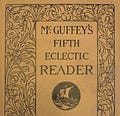

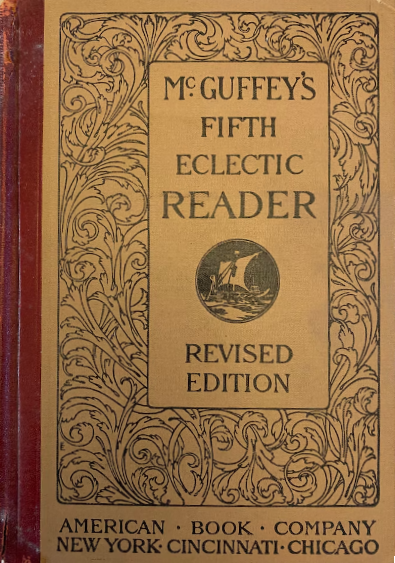

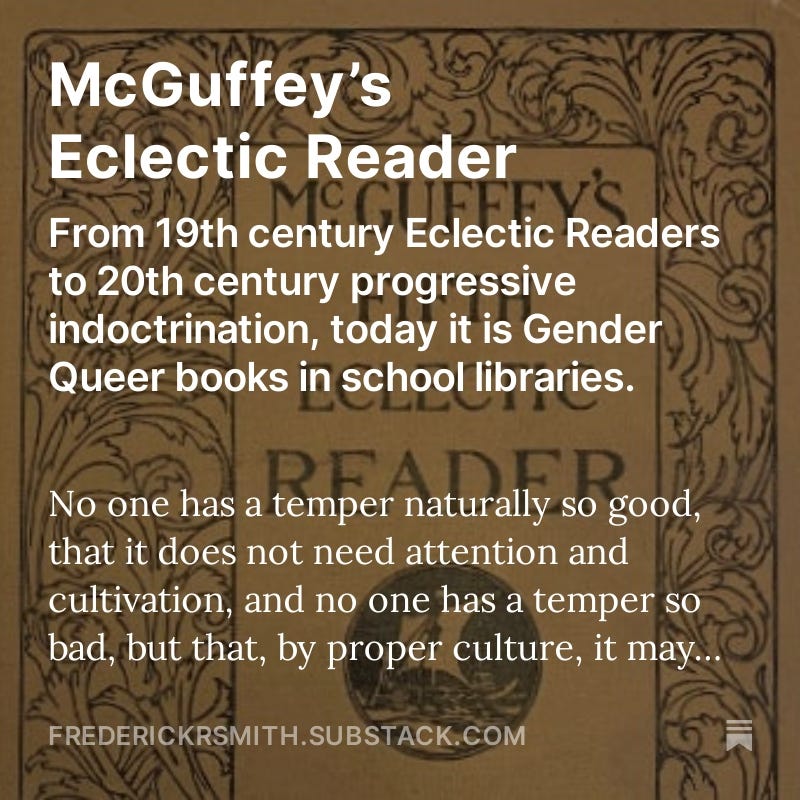
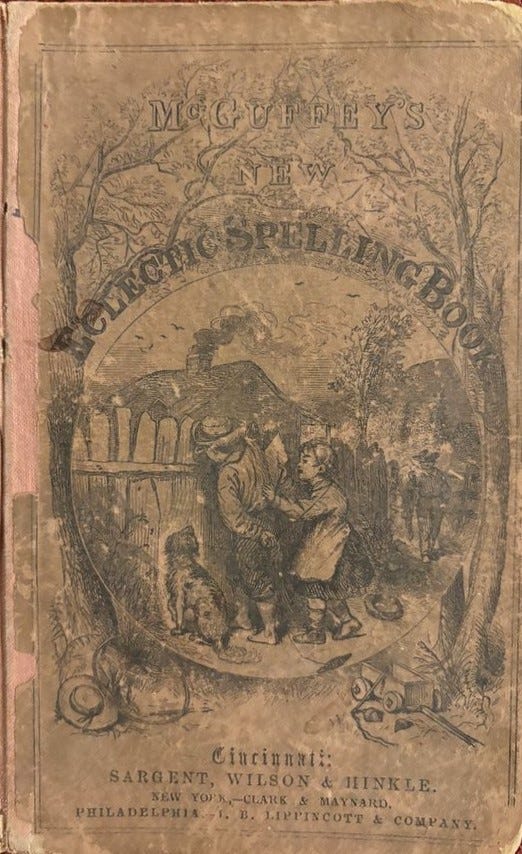

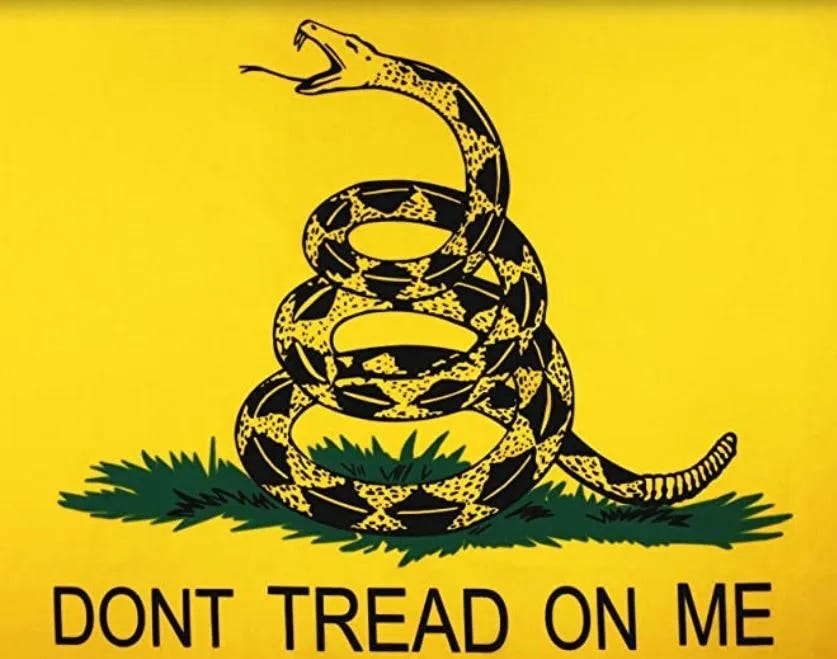
The first word I learned to read was in McGuffey reader. It was “Sun”. I remember the afternoon in Malibu with my mother, around 1960. I knew little about the man. Btw, fighting brutal control and violent subjugation by the Vatican and the Jesuits is the essential mission of Protestantism. Then the slave operations of the Jews and Freemasons would also be opposed by the orthodox Christians and the Protestants.
Another well researched and informative post. Since I was not familiar with this my education has again become broader. Thank you Frederick.